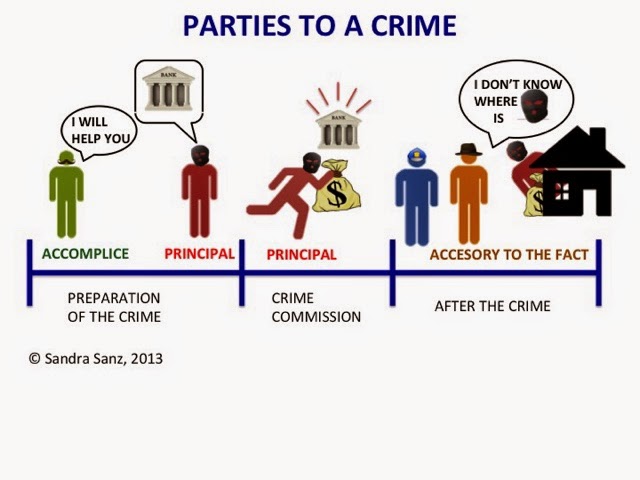Who are Principals, Accomplices and Accessories of the Crime?
| image grabbed from www.thehindu.com |
The words PRINCIPALS, ACCOMPLICES and ACCESSORIES of the crime/s may no longer be uncommon to most of us. We may have heard and read these terms in the newspapers, television and nowadays in the internet.
To differentiate the terms from each other, this post is trying to provide their definitions.
Article 17 of the Revised Penal Code of the Philippines provides who are considered as principals. Thus:
"The following are considered principals:
1. Those who take a direct part in the execution of the act;
2. Those who directly force or induce others to commit it;
3. Those who cooperate in the commission of the offense by another act without which it would not have been accomplished."
Based on the aforementioned, there three types of principals of the crime. Those are principal by direct participation, principal by inducement and principal by cooperation. Whether he may participate directly, induce or cooperate to the execution of the act, he would face the same penalty accordingly.
Accomplices are defined in Article 18 of the same Penal Code. Thus:
"Accomplices are the persons who, not being included in Article 17 of the code, cooperate in the execution of the offense by previous or simultaneous acts."
To differ it from the principal by cooperation, the accomplices cooperate by acts NOT INDISPENSABLE in the commission of the crime; meaning, that without such acts, the crime could still be committed by the culprits. If the acts are INDISPENSABLE, the person cooperation is a principal by cooperation.
Accomplices would have a penalty one degree lower from that of the principals.
On the other hand, accessories are defined in Article 19 of the penal code. Thus:
"Accessories are those who, having knowledge of the commission of the crime, and without having participated therein, either as principals or accomplices, take part subsequent to its commission in any of the following manners:
1. By profiting themselves or assisting the offender to profit by the effects of the crimes;
2. By concealing or destroying the body of the crime, or the effects or instruments thereof, in order to prevent its discovery;
3. By harboring, concealing, or assisting in the escape of the principal of the crime, provided the accessory acts with abuse of his public functions or whenever the author of the crime is guilty of the treason, parricide, murder or an attempt to take the life of the Chief Executive, or is known to be habitually guilty of some other crime."
Those who are accessories of the crime shall be punished with two degrees lower of that of the principals.
Accessories of the crimes shall be punished only in grave and less grave felonies. They are not criminally liable in light felonies however.
Source: The Revised Penal Code of the Philippines.


Comments
Post a Comment